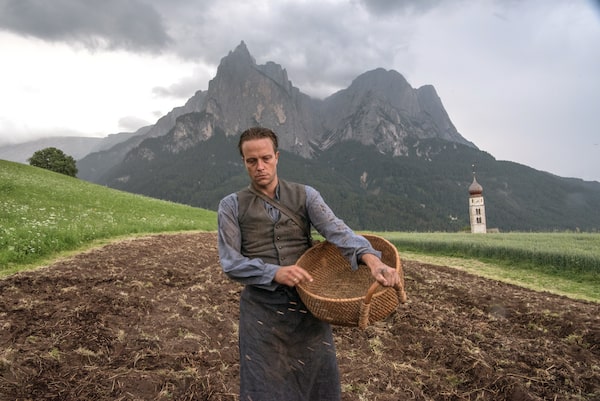
August Diehl stars in Terrence Malick's new film A Hidden Life.Reiner Bajo/Twentieth Century Fox Film Corporation
- A Hidden Life
- Written and directed by Terrence Malick
- Starring August Diehl and Valerie Pachner
- Classification PG
- 184 minutes
Film critics do not agree with each other on much, but for the latter half of the 20th century, most could nod their heads in the same direction regarding Terrence Malick. Perhaps that’s because the American filmmaker had only made three films over the course of three decades: 1973′s Badlands, 1978′s Days of Heaven and 1998′s The Thin Red Line. Each was near-universally praised as the work of a master filmmaker, an artist as concerned with the complexities of the human spirit as he was with the purity of the natural world.
Holiday movie guide: Reviews of films opening through the end of December
This love affair has waned in recent years, right about the time that Malick decided to become preposterously prolific (by his standards, any way). Between 2005 and today, the filmmaker has more than doubled the output of the first 30 years of his career, directing seven films plus a handful of shorts. There has been one unimpeachable masterpiece (2011′s The Tree of Life) but also, for some, too many curiosities and question marks (To the Wonder, Knight of Cups, Song to Song, Voyage of Time), which have divided those who once put Malick atop a pedestal. The shambolic structures, philosophical voice-overs and the expansive, lingering shots of sun-dappled nature that once enthralled had lost their hold. Malick has even become, in the eyes of some, the embodiment of art-house cliché: ponderous style over engaging substance. Pretension over potential.
I don’t believe it is Malick who has changed – only our patience, and maybe our sense of wonder. Viewed in the context of the director’s acclaimed early work, his 21st-century films can seem repetitive, sure – underwhelming in that viewers generally desire something new, or at least progression. Malick’s films are still, mostly, the singular vision of an artist driven by a steady and unchanging set of questions and values: What happens when good men are confronted with evil, and what happens when the innocence of the earth is exposed to those men? It is only that, today, we are hearing Malick ask the same questions more often. The need to dismiss such like-clockwork inquisitiveness is understandable. Especially when it is so much easier than engaging, over and over again.
Classic Malick signifiers, such as expansive, lingering shots of sun-dappled nature, are all present in A Hidden Life.Fox Searchlight Pictures/Twentieth Century Fox Film Corporation
Which is where Malick’s latest film, A Hidden Life, currently sits, at least in my tiny corner of the critical establishment. A nearly three-hour look at the resistance of Austrian farmer Franz Jagerstatter (August Diehl), a conscientious objector to serving Hitler in the Second World War, Malick’s latest film is timely although not profoundly new territory.
Again, the director finds a compelling landscape, a paradise under invasion (see the South Pacific in The Thin Red Line, Montana in Badlands, the as-yet-unsullied shores of America itself in The New World). And again, Malick finds his narrative, such as it is, hooked on a question of faith (that is, are men created to do wrong?). There is familiarity here, but sincerity too. This is all part of Malick’s cinematic forever quest for truth and beauty amidst a world that prefers lies and vulgarity – we can choose to continue alongside, or drop off.
And there are points during A Hidden Life when I was tempted to make an exit. This is a long film that also feels long – it has a distinct crawl to it that makes it one of Malick’s more questionably edited films. And the director’s employment of low-lying, wide-angle cameras, while neatly subverting the usual allegations of faux-grandeur levelled at Malick’s films, results in a dizzying nausea that is more aggravating than what I can only assume was its intended intimacy.
Diehl and Valerie Pachner convincingly portray a marriage under extraordinary pressure.Fox Searchlight Pictures/Twentieth Century Fox Film Corporation
Perhaps also unintentional is the profound lack of drama surrounding Jagerstatter and his decision. Although the farmer’s decision to refuse Hitler causes his family to be ostracized within their small village – his wife Fani (Valerie Pachner) and children are instantly aligned with a “traitor” – Malick seems uninterested in exploring any doubt or struggle on Jagerstatter’s part. From the beginning, the farmer decides that he cannot accommodate evil, and that is that. This all makes Jagerstatter, a real-life figure whose jail-house correspondence with Fani provided the basis for Malick’s script, a good and righteous man. But it does not make for especially compelling drama.
All of which leaves Diehl somewhat floundering, albeit admirably so. What tension can a performer hope to wring when his character decides that life is a fait accompli? The German actor – who, similar to most everyone else in the film, speaks accented English, which is a whole other discussion – fares better when paired with Pachner, the two convincingly portray a marriage under extraordinary pressure.
When Malick reaches the end of Jaggerstatter’s story, A Hidden Life does reach something profound. Relief, maybe, that the film was over. But also a distinct pang that some filmmakers never change.
A Hidden Life opens Dec. 20 in Toronto
Live your best. We have a daily Life & Arts newsletter, providing you with our latest stories on health, travel, food and culture. Sign up today.
 Barry Hertz
Barry Hertz